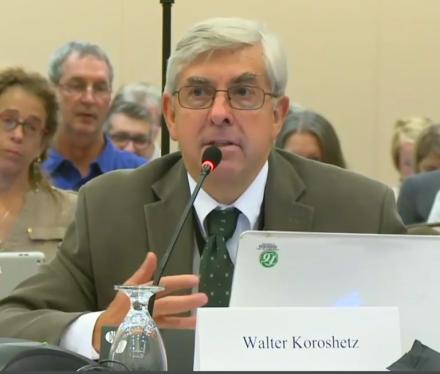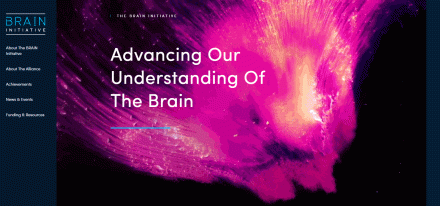I'm pleased to report that the National Institutes of Health (NIH) Brain Research through Advancing Innovative Neurotechnologies (BRAIN) Initiative® is moving along at an incredible pace. The first awards were made only two years ago, yet our grantees have published over 120 papers highlighting their work, including electromagnetic control of brain circuits to regulate feeding behaviors, and a new method for observing neuronal activity unfold in real-time across multiple areas of mouse cortex. This December, our third annual BRAIN Investigators Meeting will gather over 500 scientists to continue thinking about innovative ways to revolutionize our understanding of the human brain. Many of the meeting’s sessions will be videocast live and we are planning to open several to the public. This will allow us to engage our key stakeholders, the public, in learning more about the fantastic science we are funding and the huge promise it holds for the future.

Walter Koroshetz, M.D.
Director, NINDS
Last week, on August 2nd, the Multi-Council Working Group (MCWG) for the NIH BRAIN Initiative met with directors and staff from the 10 NIH Institutes and Centers supporting the Initiative. The MCWG is an external group of scientific experts that provides oversight of the long-term scientific vision of the initiative at NIH. MCWG meetings also provide opportunities for scientific leadership of the many federal and non-federal participants in the BRAIN initiative to coordinate and discuss shared opportunities and challenges. Specifically, this meeting (videocast available online) included updates on discussions with the Department of Energy to partner in the BRAIN Initiative, the new BRAIN Initiative Alliance, National Science Foundation (NSF) efforts in support of the initiative, and the European Union’s Human Brain Project. Additionally, the MCWG approved funding opportunity concepts related to neuroethics and informatics for Fiscal Year 2017, and discussed proposed plans for funding projects with Fiscal Year 2016 BRAIN funds.

http://www.braininitiative.org/
Screen capture of The BRAIN Initiative Alliance homepage
The MCWG meeting highlighted the many partners that comprise the BRAIN Initiative, which is a public and private effort between federal agencies (NIH, NSF, the Defense Advanced Research Projects Agency, the Food and Drug Administration, and the Intelligence Advanced Research Projects Activity) and non-federal organizations (the Howard Hughes Medical Institute/Janelia Research Campus, the Allen Institute for Brain Science, the Kavli Foundation, and the Simons Foundation). Dr. Alyssa Picchini Schaffer, scientific officer at the Simons Foundation, described the recently formed BRAIN Initiative Alliance, whose mission is to coordinate and facilitate communications from its members related to the BRAIN Initiative. She unveiled the BRAIN Initiative Alliance website , which serves as a central source of information about scientific successes, resources, and opportunities related to the initiative across all partners. The MCWG also heard updates from Dr. James Deshler regarding NSF’s activities in support of the initiative, and from Dr. Katrin Amunts who gave an overview of current activities under the Human Brain Project. A more detailed summary of the meeting is available on the BRAIN Update blog.
The day after the MCWG meeting, on August 3rd, the Neuroethics Workgroup of the MCWG met to discuss issues and deliverables relevant to research supported by the BRAIN Initiative, and this meeting was also videocast. The Neuroethics Workgroup has a multi-part charge: 1) Give input to the MCWG and NIH leadership on important ethical issues related to research funded under the NIH BRAIN Initiative; 2) Inform the MCWG and NIH leadership on research questions important for BRAIN that could be answered through neuroethics research; and 3) Draft relevant guidance documents to address critical ethical issues associated with BRAIN research. The BRAIN Initiative is ultimately focused on understanding how brain circuits work in people, which includes both recording from and modulating brain circuit activity. Researchers and clinicians have been working on this for decades, but modern tools offer unprecedented ways to access those cells and circuits. The ethical issues and questions are not necessarily new, but novel technological advances and their applications spurred by BRAIN research bring these concerns into new relief. We need to address these concerns to ensure the long-term sustainability and health of the initiative itself, and the workgroup is a key component of this effort.
At their meeting, the Neuroethics Workgroup discussed several specific issues, including long-term obligations to patients with implanted neural devices, the ethics of sharing human clinical neural data, and data privacy concerns. They also discussed workgroup deliverables that will be helpful to the BRAIN Initiative, including drafting materials on particularly pressing topics, and organizing future workshops that will explore high priority areas in depth. The group heard updates from federal BRAIN partners on how each agency incorporates ethics into their work, along with a presentation by Dr. Lisa M. Lee that described successful public outreach activities undertaken by the Presidential Commission for the Study of Bioethical Issues. The group considered how such outreach strategies could be incorporated into the workgroup’s efforts to begin engaging the public in thinking about the applications and implications of BRAIN-funded research. Details of the meeting, including the agenda and meeting summary, will be made available on the Neuroethics Workgroup’s website.
We are only in the third year since President Obama announced the BRAIN Initiative, but it is already clear this project has the potential to fundamentally change the field of neuroscience. Technology is advancing rapidly, transforming our ability to understand how the brain works, pointing the way towards new methods to treat human disease, and making unexpected discoveries along the way. From the participation in the two meetings last week, it is clear the BRAIN Initiative is creating a broad network of partnerships in both research and neuroethics, and will serve as the kernel that brings in other, similar programs that grow into something transformative.
